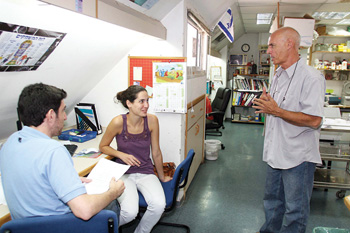| Previous issues | Subscribe |
| INITIATIVES |
|---|
|
|
| TECHNOLOGY |
|---|
|
|
|
|
| STUDENTS |
|---|
| EVENTS |
|---|
| GRADUATES |
|---|
Prof. Gidi Gross: The Open University Changed His Life, But Not His Residence
...continued from previous page.

That's What I Want to Learn"Some time in 1980 I decided I wanted to learn about nature. I never really thought about doing anything in particular with this knowledge. I just wanted to get a better understanding of things around me. The Open University was offering a number of courses, and I could learn at home, during my free time. This fit me to a tee.""I remember reviewing the catalogue. I came across a course entitled, "Introduction to Life Sciences." That was the first time that I even heard about cells, amino acids and the genetic code and I turned to my wife and said, "That's what I want to learn, thats what I want to research." "This was my way, but it's not a way that I would recommend to others. For me, it was fine. I did everything at my own pace. I was not dependent on anyone else I ran ahead with the material as I wanted to. I hardly came to meetings, because I didn't have a car then. And, to get to the laboratory in Kiryat Shmonah was a story unto itself. I would travel by tractor and then walk kilometers. I did all the homework, and I did all the exams which took place either at Tzemach near Tiberias or in Kiryat Shmonah. I began with one course a semester, and when I saw that I was keeping up and enjoying the learning, I picked up the pace to two courses and then three." Go to Weizmann Institute"For a while, I did not know what I was going to do with this study track. It was clear I would stay in Almagor. Yet, I did want to do research in life sciences and I had no idea how I would be able to accomplish that and where. In the meantime, I continued to learn, and enjoyed every moment. I completed my undergraduate degree in four years, but before that, I began to investigate the possibility of studying at other universities. Most of the universities did not know what to do with a graduate of the Open University.""And all the time, I was moving in two worlds -- okay, today I have to spray my mango plantation, but I also have to study. Studies were easy for me. I loved learning, and I loved knowing that I had the ability to learn, and was able to succeed even though I still had my farm to tend." "I remember a number of conversations I had with some people who helped me decide my future. Two people in particular from the Department of Life Sciences at the Open University stand out in my mind. One was the late Prof. Avinoam Adam and the second was Dr. Ruth Arav, who suggested Weizmann Institute. I thought this was a little ambitious, but Dr. Arav said, "go to Weizmann Institute, they will be able to see who you are and your abilities." And that's exactly what happened. I went for an interview, and I was accepted." "I began my master's program at Weizmann Institute in 1984. I would leave the house on Sunday mornings and return on Thursdays, work on my farm on Fridays. It was a bit crazy then because we also had a newborn baby daughter, and I had to find time for everything. In the end I did, and I enjoyed this period in my life. My master's degree is in genetics of the immune system, and when I continued on for my doctorate at Weizmann Institute developing a new approach for cancer immunotherapy I did not have to work as hard. I was at Weizmann Mondays through Thursdays, and was able to work at home Fridays and Sundays." Let the Genes Cure CancerGidi Gross received his doctorate in 1990, but he continued in the same field, which has developed enormously, to some degree, thanks to his research."The particular idea of man-made genes that can be introduced into the immune cells of the cancer patient and work against the cancer's growth was the idea of my supervisor Prof. Zelig Eshhar. He suggested my research project, and I was excited. During the late 1980's Weizmann Institute was one of a handful of research institutions doing breakthrough research in this field. Since then, this field has grown enormously, and a number of medical research centers around the world are engaged in clinical trials that are based on our development." |
